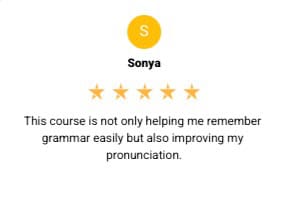10 Easy Idioms you Should be Using in IELTS Speaking
👇 Take this lesson with you! 👇
Table of Contents
Idioms are a great way to make your English sound more natural and fluent. They can also help you to express yourself more precisely and vividly. If you are preparing for the IELTS Speaking test, using idioms is a great way to boost your score.
In this blog post, we will introduce you to 10 easy idioms that you can use in IELTS Speaking. These idioms are all relatively common and easy to understand, so they are perfect for students of all levels.
To get off on the wrong foot
This idiom means to start a relationship or an interaction on a negative note.
I think I got off on the wrong foot with my new neighbour when I accidentally parked in his spot.
To put someone’s back up
If someone “puts your back up,” they annoy or irritate you.
John’s criticism of his wife’s cooking in front of everyone really put her back up.
To pull your finger out
This idiom encourages someone to start working harder or more quickly.
I’m behind on this project; I’d better pull my finger out.
To have your work cut out
When you have a challenging task ahead, you can say, “I have my work cut out.”
Teaching a class of young, energetic children? You’ve got your work cut out!
On the spur of the moment
This idiom describes doing something suddenly without planning.
I was in the park with my friend, and on the spur of the moment, we decided to buy ice-cream.

To play by ear
Similar to the previous idiom, this means to do something without planning. However, it’s not necessarily done ‘suddenly’.
I’m not sure what we’ll do this weekend; we’ll play it by ear.
To pull out all the stops
When you give your best effort in doing something, you “pull out all the stops.”
I’m playing table tennis against my skilled brother tomorrow. I’ll have to pull out all the stops to win.
To talk through your hat
If someone is talking nonsense or saying things without knowledge, they are “talking through their hat.”
I overheard someone in the pub discussing politics, and most of the time, he was talking through his hat.”
To go from strength to strength
This idiom means to continually get better or improve.
Since its beginning, the small startup has gone from strength to strength.
To get your goat
Similar to “putting someone’s back up,” this idiom means to annoy or irritate someone.
The traffic this morning really got my goat.

How to use idioms in IELTS Speaking
When using idioms in IELTS Speaking, it is important to use them correctly and naturally. Avoid using idioms that you are not familiar with, or that you are not sure how to use in context.
It is also important to use idioms sparingly. Using too many idioms in your speech can make you sound unnatural and forced.
Here are a few tips for using idioms in IELTS Speaking:
- Use idioms in context. Make sure that the idiom you are using is relevant to what you are talking about.
- Use idioms sparingly. Avoid using too many idioms in your speech.
- Make sure you understand the meaning of the idiom you are using.
- Pronounce the idiom correctly.
- Use the idiom naturally. Avoid using idioms in a forced or unnatural way.
Conclusion
Idioms are a great way to make your English sound more natural and fluent. They can also help you to express yourself more precisely and vividly. If you are preparing for the IELTS Speaking test, using idioms is a great way to boost your score.
Remember: Use idioms correctly, naturally, and sparingly.
Improve your Speaking Skills with this Free Course
Crack IELTS Speaking Part 1
Learn to Speak with Confidence in Part 1 of Your IELTS Test!
⭐️⭐️⭐️⭐️⭐️
‘It’s such a great course. I’ve learned so many usages for speaking part 1.’
Zu Htet





